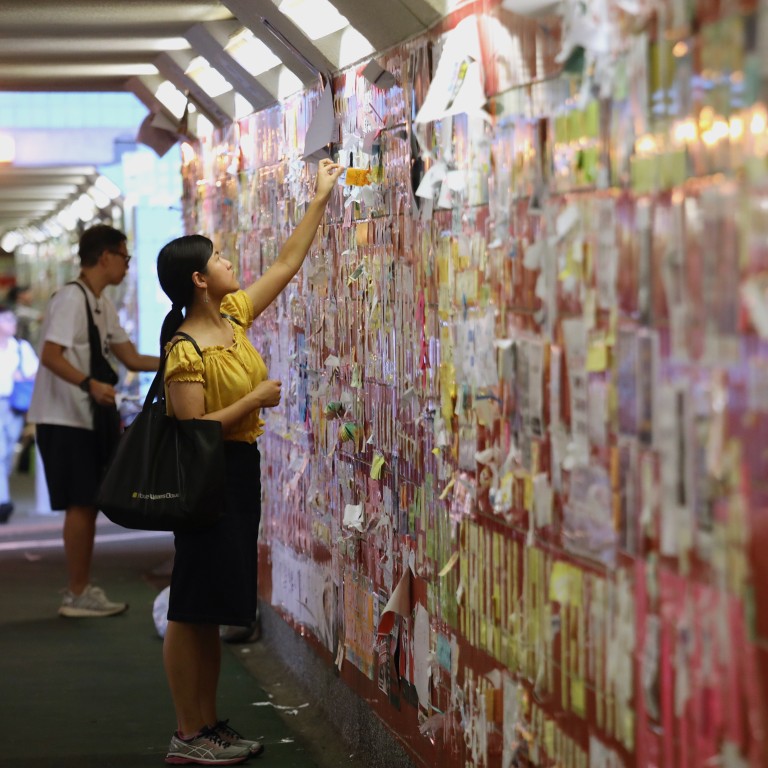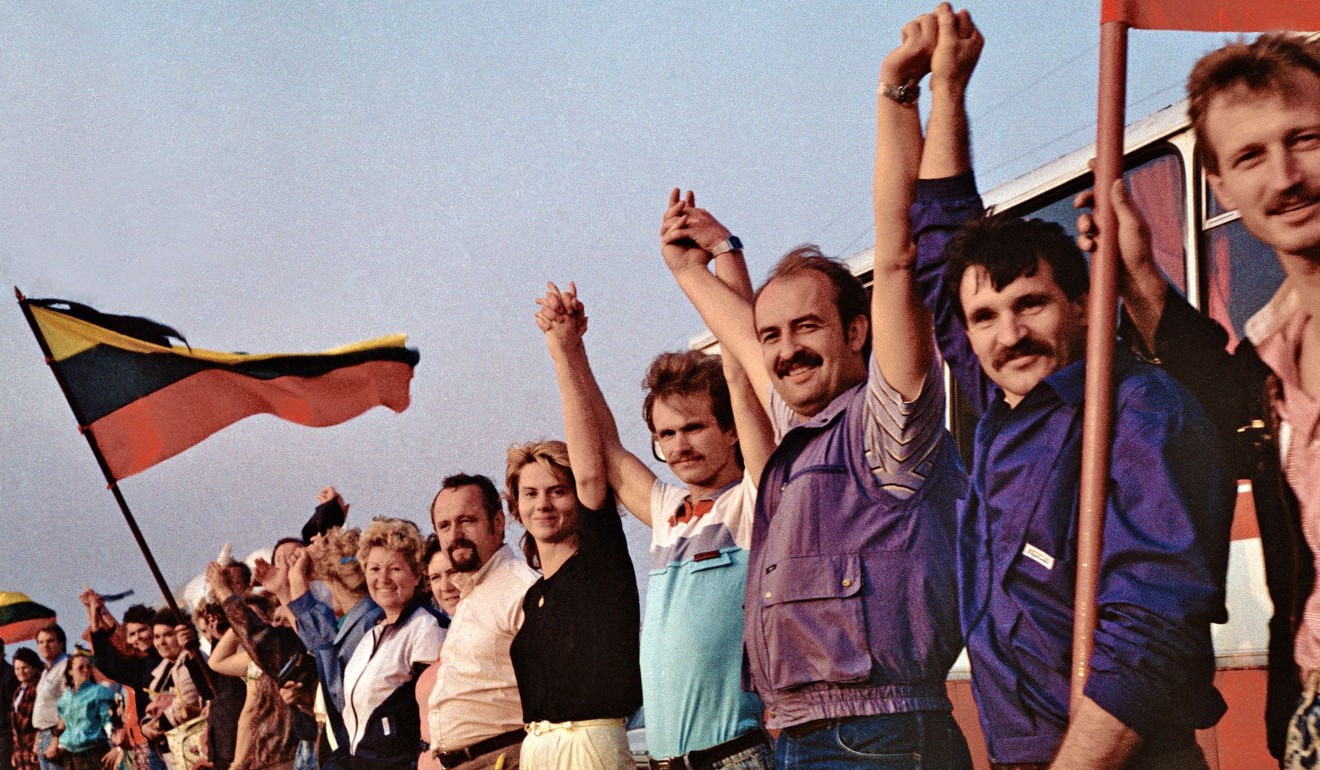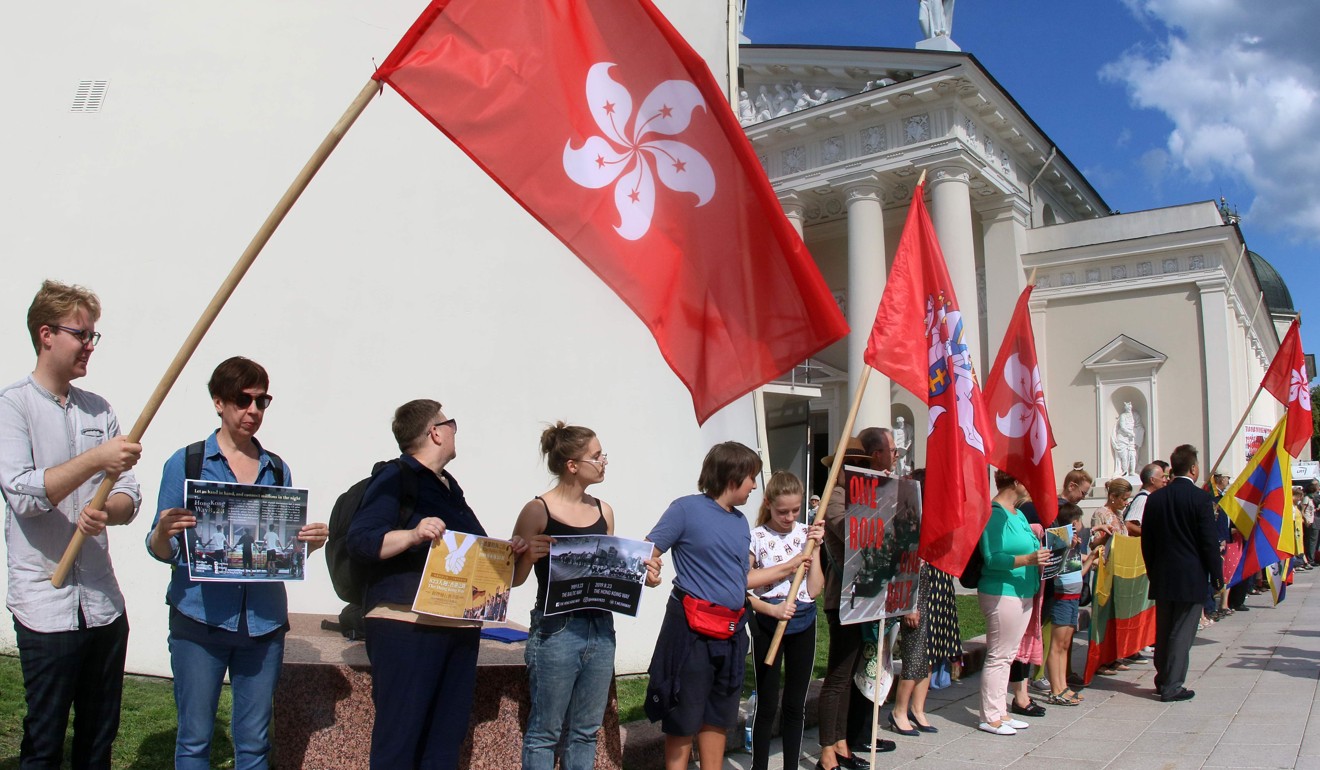
How Lennon Walls and human chains link Hong Kong’s protesters to cold war Europe
- ‘Leaderless resistance’ to controversial extradition law looks to 1980s Prague and the Baltic states for creative and peaceful means of dissent
- Analysts say Eastern Europe’s long memory of communist rule explains antipathy felt in countries like Lithuania and Czech Republic towards Beijing’s tactics
Decades after the struggle against Soviet rule in Central and Eastern Europe reached its climax, Hong Kong’s protest movement is drawing inspiration from the people who helped bring Soviet rule to an end.
Thirty years after a wave of peaceful protests proved the last straw for communist rule in Eastern Europe and rattled the Communist Party of China so badly it sent troops to crack down on pro-democracy demonstrators in Tiananmen Square, support for Hong Kong’s protests has been strong in the former Soviet bloc.
In Hong Kong, after three months of demonstrations, arrests and clashes between protesters and police, Chief Executive Carrie Lam Cheng Yuet-ngor this week formally moved to withdraw the extradition bill that sparked mass opposition.
While many of the city’s leaderless protesters took inspiration from the Occupy campaigns of 2014, the colourful mosaics of handwritten protest notes that sprang up on walls across the city recalled an era that had passed before many of the demonstrators were born.
These so-called Lennon Walls first appeared in Prague in December 1980 after the murder of John Lennon and evolved into a forum for protests in communist-ruled Czechoslovakia.
“It is very easy for people in Central and Eastern Europe to see Hong Kong’s struggle as striving for democracy [with] small Hong Kong standing against a great communist power,” said Richard Turcsanyi, a researcher at the Central European Institute of Asian Studies at Palacky University Olomouc in the Czech Republic.
“This makes people think, ‘This is just the kind of thing we did in the past’.”
Hong Kong school students form human chains as part of class boycott
Another inspiration from cold war Eastern Europe was the series of human chains known as the “Hong Kong Way”. These were formed to mark the 30th anniversary of the Baltic Way on August 23, 1989 when the people of Lithuania, Latvia and Estonia – then part of the Soviet Union – linked hands across the three republics in a show of peaceful opposition to Moscow’s rule.
This example not only added another dimension to Hong Kong protests, Turcsanyi said, but changed the dynamic between the Baltic nations, China and Hong Kong as Europeans sided with protesters in Hong Kong.

In Eastern Europe, support for Hong Kong has led to diplomatic tensions. On Monday, Lithuania’s foreign ministry summoned Chinese ambassador Shen Zhifei to answer allegations that his staff had interfered in an event in Vilnius held in support of the Hong Kong protesters on the anniversary of the Baltic Way protests.
Hundreds of Lithuanians joined hands in solidarity with the protesters, while pro-Beijing counterprotesters gathered at the scene, shouting: “Hong Kong is part of China”.
A member of Lithuania’s parliament claimed he saw Shen there, giving directions to the pro-Beijing chorus.
The Chinese foreign ministry said its diplomats did not violate local laws and followed the Vienna Convention on Diplomatic Relations.
In Estonia on August 23, an article by Chinese ambassador Li Chao appeared in the Postimees newspaper to “help Estonian people better understand the current situation in Hong Kong”.
Turcsanyi said Beijing’s efforts to control the Hong Kong debate in Eastern Europe through its diplomats was perhaps as important to the host countries as it was in China, but the approach was likely to backfire.
“Perhaps ironically, but not unexpectedly, the heavy-handed approach is more counterproductive than not and makes China seem even more similar to Russia and its disinformation activities in the aftermath of the Crimea annexation,” he said.
In August, Czech senator Pavel Fischer tweeted that peaceful protests in Hong Kong “evoked the spirit of the Prague Spring of 1968” – an uprising against Soviet rule that was ended by 500,000 Warsaw Pact troops and the crushing of Alexander Dubcek’s seven month-long reformist administration.
PLA ‘ready to defend Hong Kong’, Beijing says after troop rotation
China’s embassy in Prague responded to Fischer by saying: “Hong Kong is Chinese Hong Kong. The Chinese government will never allow foreign forces to interfere in Hong Kong’s affairs, and will never allow any foreign forces to cause chaos in Hong Kong.”
“I do believe that worries about the Soviet Union’s collapse are in the minds of leaders in Beijing,” Turcsanyi said. “The Baltic Way replay in Hong Kong was certainly not overlooked.”
Martin Hala, a director of Sinopsis, a Prague-based project that tracks China’s impact around the world, said: “China could easily suppress the demonstrations in Hong Kong by overwhelming military force, just like the Warsaw Pact did in Czechoslovakia in 1968. But that eventually turned out to be a pyrrhic victory which contributed to the Soviet Union’s collapse 20 years later.”

While the incident created diplomatic trouble, observers said Central European nations will have to be careful in how they manage their relations with Beijing.
Krzysztof Debiec, a researcher at the Centre for Eastern Studies in Warsaw, said many political elites did not want to engage in conflicts with superpowers.
Politicians in the Czech Republic, for example, reassured Beijing of their intent to maintain good relations when its senior officials met the Dalai Lama in 2016. In March, Taiwan’s representative in the Czech Republic was forced out of an economic meeting.
“They [Central and Eastern European countries] avoid taking stances on issues that might be perceived as internal affairs of superpowers, such as China,” he said.
“The current Czech government demonstrates a pragmatic approach, counting on the further opening up of the Chinese market to Czech products, so it doesn’t want to open itself to attacks from Beijing.”

